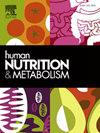Effect of L-arginine, L-citrulline and micronutrient supplementation on elevated triglyceride levels and metabolic syndrome severity score
IF 1.8
Q3 ENDOCRINOLOGY & METABOLISM
引用次数: 0
Abstract
Metabolic syndrome (MetS) is characterized by a cluster of metabolic disturbances, including elevated triglyceride (TAG) levels, obesity, and hypertension, and is associated with an increased risk of coronary heart disease and type 2 diabetes mellitus. Dietary interventions involving L-arginine (L-Arg), L-citrulline (L-Cit) and micronutrients may support numerous physiological functions and improve health during metabolic disturbances. We hypothesized that L-Arg, L-Cit, and micronutrient supplementation decreases elevated TAG levels (≥150 mg/dL) and improves metabolic health. This proof-of-principle study was an eight-week randomized double-blind intervention involving 60 obese individuals (age: 59.9 ± 7.5 years, BMI: 33.6 ± 4.7 kg/m2, TAG level: 211 ± 71.2 mg/dL). The study aimed to investigate the potential effects of L-Arg, L-Cit, and micronutrient supplementation on TAG levels and the MetS severity score based on waist circumference (WC). After eight-weeks of supplementation, the verum group showed a significant decrease in TAG levels compared to placebo (p < 0.001), and significant reductions in LDL-C (p = 0.038), systolic blood pressure (BP) (p = 0.040), and body fat mass (p = 0.045). In contrast, no effects were observed on fasting glucose, WC or diastolic BP. Participants in the verum group showed a significant decrease in the MetS severity score (p = 0.041), suggesting an improvement in metabolic health, while those in the placebo group showed no changes. This proof-of-principle study indicate that L-Arg, L-Cit, and micronutrient supplementation may reduce TAG levels and potentially improve overall metabolic health in obese individuals with elevated TAG. Confirmatory studies are needed to substantiate these exploratory findings.
补充l -精氨酸、l -瓜氨酸和微量营养素对甘油三酯水平升高和代谢综合征严重程度评分的影响
代谢综合征(MetS)以一系列代谢紊乱为特征,包括甘油三酯(TAG)水平升高、肥胖和高血压,并与冠心病和2型糖尿病的风险增加有关。饮食干预包括l -精氨酸(L-Arg)、l -瓜氨酸(L-Cit)和微量营养素可以支持许多生理功能,并在代谢紊乱期间改善健康。我们假设补充l -精氨酸、l -柠檬酸盐和微量营养素可以降低升高的TAG水平(≥150mg /dL)并改善代谢健康。这项原理验证研究是一项为期8周的随机双盲干预,涉及60名肥胖个体(年龄:59.9±7.5岁,BMI: 33.6±4.7 kg/m2, TAG水平:211±71.2 mg/dL)。该研究旨在探讨补充l -精氨酸、l -柠檬酸和微量营养素对TAG水平和基于腰围(WC)的MetS严重程度评分的潜在影响。补充八周后,与安慰剂相比,verum组的TAG水平显著降低(p < 0.001), LDL-C (p = 0.038)、收缩压(BP) (p = 0.040)和体脂量(p = 0.045)也显著降低。相反,对空腹血糖、WC或舒张压没有影响。verum组的参与者在MetS严重程度评分上显着下降(p = 0.041),表明代谢健康有所改善,而安慰剂组的参与者则没有变化。这项原理验证研究表明,补充l -精氨酸、l -柠檬酸盐和微量营养素可能会降低TAG水平,并可能改善TAG升高的肥胖个体的整体代谢健康。需要进一步的研究来证实这些探索性的发现。
本文章由计算机程序翻译,如有差异,请以英文原文为准。
求助全文
约1分钟内获得全文
求助全文
来源期刊

Human Nutrition and Metabolism
Agricultural and Biological Sciences-Food Science
CiteScore
1.50
自引率
0.00%
发文量
30
审稿时长
188 days
 求助内容:
求助内容: 应助结果提醒方式:
应助结果提醒方式:


